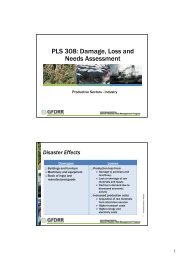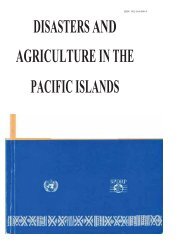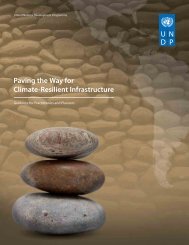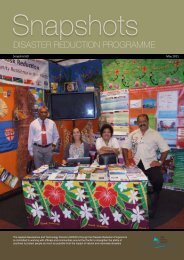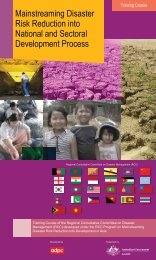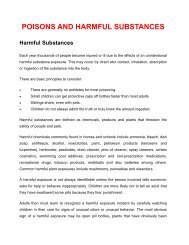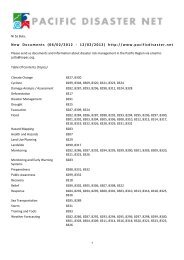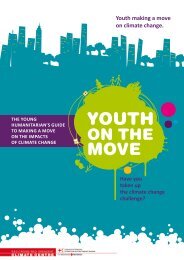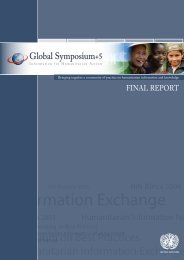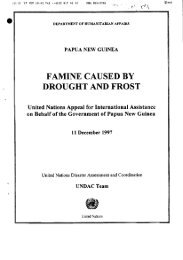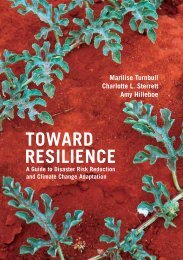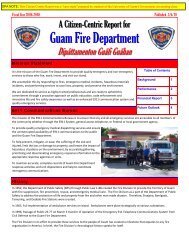A global review of disaster reduction initiatives - Welcome to the ...
A global review of disaster reduction initiatives - Welcome to the ...
A global review of disaster reduction initiatives - Welcome to the ...
Create successful ePaper yourself
Turn your PDF publications into a flip-book with our unique Google optimized e-Paper software.
and production, soil conservation, irrigation,watershed management, sanitation, coastal zoneand marine resource management, integratedpest management, land-use planning, forestconservation and community forestry, fisheries,natural <strong>disaster</strong> prevention, and new and renewablesources <strong>of</strong> energy, focusing particularly onindigenous women's knowledge and experience."Five years later, <strong>the</strong> <strong>review</strong> and appraisal <strong>of</strong> <strong>the</strong>implementation <strong>of</strong> <strong>the</strong> Beijing Platform forAction (2000) identified natural <strong>disaster</strong>s andepidemics as emerging issues, which deservedgreater attention. It was noted that <strong>the</strong> social andeconomic impact <strong>of</strong> natural <strong>disaster</strong>s andepidemics remained relatively invisible as a policyissue, in particular <strong>the</strong>ir impact on <strong>the</strong> status<strong>of</strong> women and <strong>the</strong> achievement <strong>of</strong> gender equality.In <strong>the</strong>ir responses <strong>to</strong> a questionnaire, severalstates in Africa and Asia cited <strong>the</strong> feminization <strong>of</strong>poverty, <strong>of</strong>ten aggravated by natural <strong>disaster</strong>sand crop failure, as an obstacle <strong>to</strong> improvinggender equality.The twenty-third special session <strong>of</strong> <strong>the</strong> GeneralAssembly entitled "Women 2000: gender equality,development and peace for <strong>the</strong> twenty-firstcentury" acknowledged an increase in casualtiesand damage caused by natural <strong>disaster</strong>s andraised awareness <strong>of</strong> <strong>the</strong> inefficiencies and inadequacies<strong>of</strong> existing approaches and interventionmethods in responding <strong>to</strong> such emergency situations,from a gender perspective.It suggested that a gender perspective be incorporatedin<strong>to</strong> <strong>disaster</strong> prevention, mitigation andrecovery strategies. The special session alsorecommended that <strong>the</strong> UN system and internationalorganizations should assist governments indeveloping gender-sensitive strategies for <strong>the</strong>delivery <strong>of</strong> assistance and responses <strong>to</strong> humanitariancrises resulting from natural <strong>disaster</strong>s.Related international commitments and <strong>the</strong> UN role in <strong>disaster</strong> risk <strong>reduction</strong>Gender mainstreaming: This is <strong>the</strong> process <strong>of</strong>bringing a gender perspective in<strong>to</strong> <strong>the</strong> mainstreamactivities <strong>of</strong> governments at all levels, as a means <strong>of</strong>promoting <strong>the</strong> role <strong>of</strong> women in <strong>the</strong> field <strong>of</strong> development,integrating women's values in<strong>to</strong> developmentwork. Gender mainstreaming builds on <strong>the</strong>knowledge and lessons-learnt from previous experienceswith gender equality policies.Gender analysis: Gender analysis involves <strong>the</strong>collection and use <strong>of</strong> sex-disaggregated data thatreveal <strong>the</strong> roles and responsibilities <strong>of</strong> men andwomen, <strong>to</strong> be fed in<strong>to</strong> <strong>the</strong> policy process forenabling assessments <strong>of</strong> how existing and futurepolicies and programmes potentially affect men andwomen differently. Gender analysis needs <strong>to</strong> be bothquantitative and qualitative.The committee has urged certain states <strong>to</strong> paygreater attention <strong>to</strong> environment and natural <strong>disaster</strong>s.In <strong>the</strong> case <strong>of</strong> Nicaragua, it suggested thataspects <strong>of</strong> natural <strong>disaster</strong>s impeded women's fullenjoyment <strong>of</strong> <strong>the</strong>ir rights. When it considered <strong>the</strong>report <strong>of</strong> Kazakhstan, <strong>the</strong> committee expressedconcern about <strong>the</strong> degree <strong>of</strong> environmental degradationin <strong>the</strong> country and its extremely negativeimpact on <strong>the</strong> health <strong>of</strong> <strong>the</strong> whole population, inparticular on women and children.The committee also expressed its concern about<strong>the</strong> degree <strong>of</strong> environmental degradation inUzbekistan and its negative impact on <strong>the</strong> health<strong>of</strong> <strong>the</strong> whole population, in particular womenand children.In <strong>the</strong> case <strong>of</strong> Belarus, <strong>the</strong> committee noted <strong>the</strong>government's attempts <strong>to</strong> deal with <strong>the</strong> healthimpact <strong>of</strong> <strong>the</strong> Chernobyl <strong>disaster</strong> and addressedthis issue as a principal area <strong>of</strong> concern.Commission on <strong>the</strong> Status <strong>of</strong> Women6Convention on <strong>the</strong> Elimination <strong>of</strong>Discrimination against WomenSeveral articles <strong>of</strong> <strong>the</strong> Convention on <strong>the</strong> Elimination<strong>of</strong> Discrimination against Women explore <strong>the</strong>violations <strong>of</strong> women's human rights in <strong>the</strong> case <strong>of</strong>natural <strong>disaster</strong>s. A number <strong>of</strong> general recommendations,adopted by <strong>the</strong> Committee on <strong>the</strong>Elimination <strong>of</strong> Discrimination Against Women,also <strong>of</strong>fer interpretation <strong>of</strong> articles <strong>of</strong> <strong>the</strong> conventionas <strong>the</strong>y relate <strong>to</strong> <strong>disaster</strong>s and environment.The UN Commission on <strong>the</strong> Status <strong>of</strong> Women,in its programme <strong>of</strong> work for 2002-2006, willconsider <strong>the</strong> "environmental management andmitigation <strong>of</strong> natural <strong>disaster</strong>s: a gender perspective".In preparation for this <strong>to</strong>pic, an expertgroup was organized by <strong>the</strong> United Nations Divisionfor <strong>the</strong> Advancement <strong>of</strong> Women (DAW) incollaboration with <strong>the</strong> ISDR Secretariat.The expert group meeting discussed <strong>the</strong> linkbetween gender and environmental manage-297



